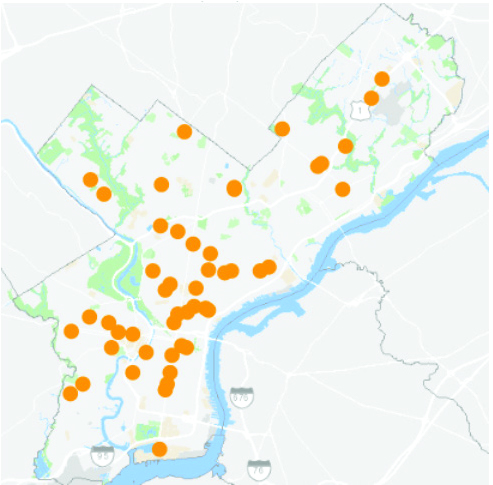Containment
The COVID-19 virus has vulnerabilities. The incubation period (the time from exposure to symptom onset) for most people with infection is four to six days but can be up to 14 days. This is long enough to take action to prevent further spread. And while many people with the infection show no symptoms, a significant proportion are symptomatic with fever and new onset of cough, so many cases can be identified. While no public health actions can prevent spread from all cases, these vulnerabilities suggest that containment actions can be partially successful in reducing community spread. Containment involves a combination of rapid case identification, case isolation, contact tracing, and contact quarantine.
Case identification through widespread laboratory testing
COVID-19 cases can be identified through laboratory testing of individuals with COVID-19 symptoms, and/or those with reasonable suspicion of exposure. From June through August, Philadelphia will implement large-scale, rapid testing (i.e. results in 24 hours or less) to quickly identify new “cases” (people with confirmed COVID-19 infection). Testing is currently available at 47 sites across Philadelphia, including hospitals, Federally Qualified Health Centers, pharmacies, and urgent care centers, at no out-of-pocket cost to residents, and the number of sites will be expanded to under-served neighborhoods. Testing will also be offered through outreach to populations suffering a disproportionate impact (e.g., African Americans) and vulnerable populations, such as individuals experiencing homelessness and those living in congregate settings. Any resident with fever or respiratory symptoms or with exposure to a known or suspected case of COVID-19 infection will be actively encouraged to be tested. As point-of-care testing devices become more reliable and widely available, they will be deployed to testing sites so that results can be reported in hours instead of the following day. Positive tests will be reported to the Philadelphia Department of Public Health by testing sites and laboratories quickly to so that case isolation and contact tracing can begin without delay.

Case isolation
People with the infection will be asked and provided with instructions to self-isolate for at least 10 days after the onset of symptoms to prevent the spread of the virus to others. The City, working with other providers, will offer support as needed (for example, meals) for those who isolate at home and identify safe isolation accommodations for those who cannot safely isolate at home.
Contact tracing
To prevent further spread, the Department of Public Health will work with testing sites and health care providers to quickly identify people who may have been in close contact to individuals with the infection (“contacts”). Following notification of a positive test in a person (the “case”), Department of Public Health representatives or designees will interview the case to identify their contacts, including asking questions about whom they live with, with whom they work, and what locations they have visited. Staff will also work with the employer and any locations visited while the case was able to spread the virus to identify additional contacts. This may be supplemented by electronic information from cell phones, such as using tools under development by Apple and Google that can help identify people that were exposed but unknown to the positive case. The Department of Public Health will also be notified of residents from Philadelphia who are in contact with cases outside the city and need to be monitored.
Contact tracing staff will counsel contacts about their risk and need for quarantine and will connect them to testing and other supports as appropriate. Contact tracing involves disclosure of information that is ordinarily kept private. Because of the importance of privacy, as well as the need to work with health departments from neighboring jurisdictions, contact tracing will be coordinated centrally by the Department of Public Health. For contact tracing to succeed, staff carrying out the work must be sensitive to the needs of those they are interviewing, and people with the infection must be comfortable with the staff; for this reason, the Department of Public Health will hire staff that are representative of the subgroups and communities from which the cases they are interviewing arise.
Contact quarantine and monitoring
Contacts (those who have spent more than 15 minutes in close contact to the case during the case’s infectious period) will be asked to quarantine at home for 10 days after the last known exposure. Quarantine may be shortened to 7 days if a negative test was obtained in the previous 48 hours. All people in quarantine will be contacted daily to ensure that they are following instructions to avoid contact with others, to determine if they have developed any symptoms, and to help them receive testing or medical care. The Department of Public Health, working with other providers, will offer needed support (for example, meals) for those who need to quarantine at home and identify safe accommodations for those who cannot safely quarantine at home.
